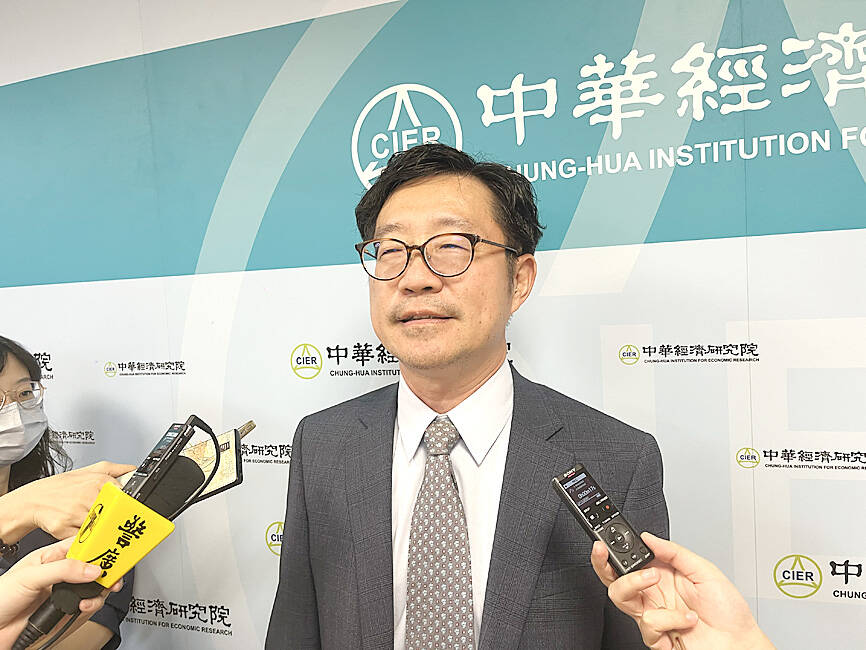The head of one of the nation’s leading economic think tanks yesterday slammed the US’ method for calculating sweeping global tariffs, including a 32 percent tariff on Taiwanese goods, as “simplistic and crude.”
Chung-Hua Institution for Economic Research (CIER, 中華經濟研究院) president Lien Hsien-ming (連賢明) wrote on Facebook that his organization had been working under the wrong assumption about the US tariffs.
The institute, along with the Ministry of Finance, believed that because of the complexity of calculating tariffs and the short time frame for doing so, the US would opt for a uniform tariff on all countries, Lien said.

Photo: Hsu Tzu-ling, Taipei Times
“As it turned out, they had a unique way of calculating the reciprocal tariffs,” he said.
At a Rose Garden event on Wednesday, US President Donald Trump announced a baseline 10 percent tax on imports from all countries, taking effect tomorrow, while countries with larger trade surpluses with the US would face higher reciprocal duties beginning on Wednesday next week, he said, without disclosing a specific formula for the calculations.
Following Trump’s announcement, many on social media speculated that the White House had derived its tariff rates using a controversial method and questioned that the figures appeared to reflect the US trade deficit as a proportion of total imports from each country.
In Taiwan’s case, Lien said the tariff rate was calculated by dividing the US’ trade deficit with Taiwan last year, at US$73.9 billion, by the total cost of goods the US imported from Taiwan, at US$116.2 billion. This works out to 63.6 percent and was rounded up to 64 percent.
“Trump says he is merciful, and so Taiwan’s tariff is set at 32 percent,” or half of 64 percent, Lien said, calling the method “simplistic and crude.”
If the US had used 2023 trade figures, and divided the trade deficit that year of US$47.8 billion by the US$87.7 billion imports from Taiwan in the year, the figure would be 58 percent and the tariff rate would have been 29 percent, he said.
The government yesterday described the 32 percent tariffs on Taiwan as “unreasonable” and “highly regrettable,” and said it would lodge “a solemn representation” with the US Trade Representative and continue negotiations with the US to protect its interests.

With an approval rating of just two percent, Peruvian President Dina Boluarte might be the world’s most unpopular leader, according to pollsters. Protests greeted her rise to power 29 months ago, and have marked her entire term — joined by assorted scandals, investigations, controversies and a surge in gang violence. The 63-year-old is the target of a dozen probes, including for her alleged failure to declare gifts of luxury jewels and watches, a scandal inevitably dubbed “Rolexgate.” She is also under the microscope for a two-week undeclared absence for nose surgery — which she insists was medical, not cosmetic — and is

CAUTIOUS RECOVERY: While the manufacturing sector returned to growth amid the US-China trade truce, firms remain wary as uncertainty clouds the outlook, the CIER said The local manufacturing sector returned to expansion last month, as the official purchasing managers’ index (PMI) rose 2.1 points to 51.0, driven by a temporary easing in US-China trade tensions, the Chung-Hua Institution for Economic Research (CIER, 中華經濟研究院) said yesterday. The PMI gauges the health of the manufacturing industry, with readings above 50 indicating expansion and those below 50 signaling contraction. “Firms are not as pessimistic as they were in April, but they remain far from optimistic,” CIER president Lien Hsien-ming (連賢明) said at a news conference. The full impact of US tariff decisions is unlikely to become clear until later this month

GROWING CONCERN: Some senior Trump administration officials opposed the UAE expansion over fears that another TSMC project could jeopardize its US investment Taiwan Semiconductor Manufacturing Co (TSMC, 台積電) is evaluating building an advanced production facility in the United Arab Emirates (UAE) and has discussed the possibility with officials in US President Donald Trump’s administration, people familiar with the matter said, in a potentially major bet on the Middle East that would only come to fruition with Washington’s approval. The company has had multiple meetings in the past few months with US Special Envoy to the Middle East Steve Witkoff and officials from MGX, an influential investment vehicle overseen by the UAE president’s brother, the people said. The conversations are a continuation of talks that

CHIP DUTIES: TSMC said it voiced its concerns to Washington about tariffs, telling the US commerce department that it wants ‘fair treatment’ to protect its competitiveness Taiwan Semiconductor Manufacturing Co (TSMC, 台積電) yesterday reiterated robust business prospects for this year as strong artificial intelligence (AI) chip demand from Nvidia Corp and other customers would absorb the impacts of US tariffs. “The impact of tariffs would be indirect, as the custom tax is the importers’ responsibility, not the exporters,” TSMC chairman and chief executive officer C.C. Wei (魏哲家) said at the chipmaker’s annual shareholders’ meeting in Hsinchu City. TSMC’s business could be affected if people become reluctant to buy electronics due to inflated prices, Wei said. In addition, the chipmaker has voiced its concern to the US Department of Commerce